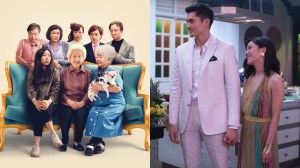The Crazy Rich Asians obsession might never stop haunting us. It has come back in the form of reality television, demanding attention and praise for its groundbreaking representation.
Netflix’s reality series Bling Empire ascended to the platform’s top charts soon after its release on Jan. 15. It offers everything we need to escape from the yearlong pandemic: filthy rich Asians who thrive on glamorous parties and trivial dramas in sunny Los Angeles. But its popularity rides on the indulgence of old tropes, its tone deafness made worse in a pandemic era of anti-Asian racism.
Videos by VICE

Bling Empire starts with the cast celebrating Lunar New Year on Rodeo Drive, displaying senseless wealth and charity for an occasion otherwise meant for family reunions. To enter this unfamiliar world, we follow the footsteps of Kevin Kreider, a broke model who fell into this magical social circle by chance.
Kevin serves as an entry point, a thread that strings the group together. His story about being bullied in school is one that would resonate with many Asian Americans like myself, but beyond the brief mention, he shares little else about growing up as a minority in a predominantly white neighborhood. Much of my sympathy for Kevin ends when he turns into yet another dude who interprets a co-star’s rejection as her playing hard to get. If the producer expected viewers to immerse in Bling Empire through Kevin’s outsider lens, he’s far from likeable or even relatable. The rest of the cast is even more removed from reality.

Bling Empire’s executive producer, Jeff Jenkins, who had worked on Keeping Up With the Kardashians, admitted to drawing his inspiration from the Crazy Rich Asians film. The crazy rich theme guarantees an audience who enjoys living vicariously through the ultra-wealthy on screen. Adding a layer of intrigue and exoticism about “Asian culture” to the recipe yields a tried and true formula for mainstream success.
Like Selling Sunset and the Kardashians franchise, Bling Empire bears the hallmarks of an enticing docuseries about the socialites of L.A.: toxic relationships, petty rivalries, and extravagance.
We may frown upon its superficiality, but Bling Empire entertains with its over-the-top, jewelry-obsessed cast, shattering presumptions about Asians being too reserved to broadcast their private lives on television.

One of the show’s most gripping storylines revolves around the show’s couture queen, Christine Chiu, and her past struggle in producing a male heir for the family. Yet there are plenty of instances where the Bling Empire stars reinforce cultural stereotypes and misinformation upon themselves. At the very beginning, Christine flaunts her husband as a direct descendant of the Song dynasty. She explains that he would be an emperor if imperial dynasties were still in existence in China — except that the Song dynasty eventually came into conflict with and was wiped out and succeeded by the Mongol-led Yuan dynasty.
Then in one dramatic scene, DJ Kim Lee and hairdresser-singer Guy Tang decide to throw a “disgusting” supersized penis pump out of a second-floor bathroom window during a private house party. This disrespectful action causes a scene (and a running drama for half of the series) between the unapologetic Kim and the house host Anna Shay. Their mutual friend, Kane Lim, tries to deescalate the drama by saying: “We’re Asians. We don’t fight.”
Kane’s simplistic, misleading assumption about Asians being pacifists is parallel to Western media attributing East Asia’s COVID-19 successes to Confucian values. A multitude of analysts have written about how COVID-19 policies are so effective in Asia because people barely question their government, not because of their knowledge and preparedness accumulated from several recent epidemics. This type of mindset also disregards a long history of resistance movements in different corners of Asia, reducing Asians to the stereotypes of being docile and passive.
While the Bling Empire crew has reiterated excitement for broader representation and diversity on reality television, it speaks little for the Asian American community as a whole. Fans of the show are swooning over “rich Asian culture” or wishing for a “crazy rich Asian friend.” These unrealistic expectations are perpetuated by the blurring of wealth and culture in the series, which encapsulates neither genuine diversity nor reality.

Given Asia being the world’s largest and most diverse continent, a universal Asian culture is fabricated by imagination. “Rich Asian culture” sounds even more absurd. The umbrella term, “Asian American,” too, was coined in the late 1960s to unite a multiethnic group — mostly Japanese and Chinese Americans — against discrimination and hate crimes. But even as new waves of Asian immigrants arrived in the United States, the Asian American label has remained largely associated with privileged East Asians. Bling Empire’s emphasis on a niche circle of Asian Americans reminds us that we’re the most economically divided racial group in the country. And although filming started in 2019, Netflix’s decision to release this feel-good show in 2021 ignores painful issues such as the blame we have unfairly received during the pandemic, a surge in violence against our community, and disproportionate losses among Filipino American healthcare workers.
Asian Americans are consistently framed as the high-achieving model minority — somehow immune to economic hardships and racism — now also bearing the burden to be crazy and rich to appease a Hollywood that fetishizes Asians driving Lamborghinis. Bling Empire’s sloppy attempt at half-hearted representation is as problematic as former Democratic presidential primaries candidate Andrew Yang touting himself as “an Asian guy who’s good at math.”
I’ve been reminded to be grateful for having any representation in mass media, even if it’s in the form of Asian Kardashians or Yang. Even if it means we have to play up our stereotypes to amuse the audience. If people who look like me get to share their shoe collection to millions of viewers, I should be thanking the producers for coming up with such a novel idea and giving my people a chance. Bling Empire is good for those seeking several hours of mindless entertainment, but it offers no escape or progress.





